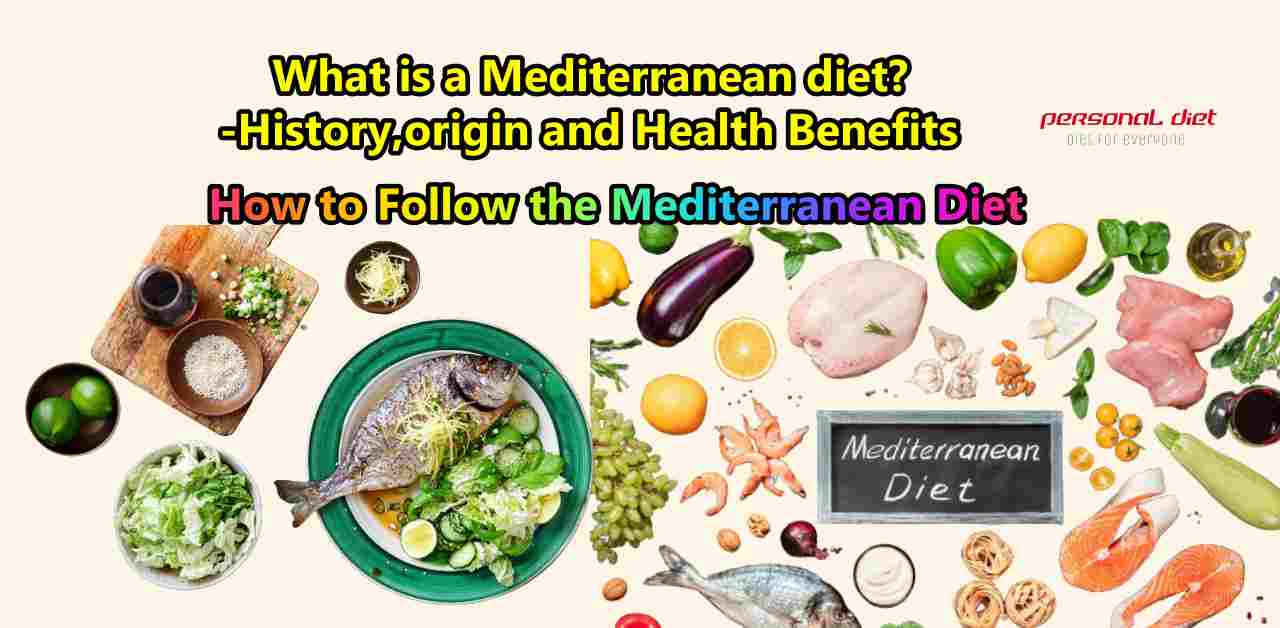A Mediterranean diet is based on the traditional dietary patterns of countries near the Mediterranean Sea, such as Greece, Italy, and Spain. The diet emphasizes whole, minimally processed foods like fruits, vegetables, whole grains, legumes, nuts, seeds, and healthy fats. In addition, it limits the consumption of red meat and processed foods.
The Mediterranean diet has gained popularity recently due to its numerous health benefits. Studies have suggested that following a Mediterranean-style eating pattern can reduce the risk of heart disease, stroke, and certain types of cancer and improve cognitive function and life expectancy.
Mediterranean diets are not only known for their health benefits but also for their delicious and varied culinary offerings. The diet comprises a wide variety of tasty and satisfying foods, so many people find it easy to follow and enjoyable.
Please refer to the full article for more information regarding the Mediterranean diet. Our discussion will cover the history and origins of this diet, its key components, the scientific evidence supporting its benefits, and practical tips on incorporating it into your daily activities.
A Mediterranean diet is worth exploring, whether you wish to improve your health or enjoy delicious and nutritious food.
Table of Contents
History and origin
A rich history and cultural heritage are behind the Mediterranean diet dating back thousands of years to ancient Greece and Rome. The health benefits of Mediterranean diets were first recognized during the mid-20th century, however, when researchers began studying the dietary patterns of people in Mediterranean countries, such as Greece and Italy.
As the name suggests, the traditional Mediterranean diet is based on people’s eating habits in countries bordering the Mediterranean Sea. These countries are Greece, Italy, Spain, and Turkey.

Among the characteristics of this diet is the high intake of plant-based foods, including fruits, vegetables, whole grains, legumes, nuts, and seeds, as well as healthy fats such as fish. Consuming moderate quantities of dairy products, poultry, and eggs is also recommended, but red meat and processed foods should be avoided.
The geographical location and climate of the Mediterranean region have influenced a traditional Mediterranean diet. A warm, sunny climate permits access to fresh fruits and vegetables all year, while the sea provides an abundance of fish and seafood. Furthermore, olive trees, native to the region, contribute healthy fats and antioxidants to the diet.
Diets based on the Mediterranean way of life are also popular because of their cultural and social characteristics. Cooking is usually done using traditional methods, such as grilling, roasting, and baking, and meals are often enjoyed with family and friends.
Mediterranean diets, which have been linked to reduced risk of chronic diseases and improved health and well-being in numerous studies, are regarded today as one of the healthiest eating in the world.
Key components of the Mediterranean diet
Mediterranean diets are characterized by consuming whole, minimally processed foods high in nutrients and antioxidants. Mediterranean diets consist of the following components
- Plant-based foods: As part of the Mediterranean diet, fruits, vegetables, whole grains, legumes, nuts, and seeds are emphasized. In addition to providing essential vitamins, minerals, fiber, and antioxidants, these foods have also been linked to some health benefits, such as a decreased risk of heart disease and cancer.
- Healthy fats: Olive oil, avocados, nuts, and fatty fish are all components of the Mediterranean diet that are rich in healthy fats. Omega-3 fatty acids are provided by these foods and are associated with a reduced risk of heart disease, stroke, and other chronic diseases.
- Fish and seafood: The Mediterranean region is well known for its abundant fish and seafood, a significant part of the diet. Omega-3 fatty acids and protein are the key components in these foods, rich in vitamins, minerals, and fiber.
- Moderate dairy intake: In moderation, Mediterranean diets include dairy products such as cheese and yogurt. The saturated fat content in these foods limits their ability to provide essential nutrients such as calcium and protein.
- Limit red meat and processed foods: A Mediterranean diet avoids red meat and processed foods, such as sugary drinks and snacks. It is recommended that these foods be replaced with healthier alternatives such as fish, poultry, and plant proteins, which have been linked to an increased risk of chronic diseases.
Also Read-
- 10 Different Types of Diet Plans For weight loss & Healthy Life
- Antioxidant-Rich Foods in India You Didn’t Know About
Health Benefits of a Mediterranean diet
Numerous studies have demonstrated that Mediterranean-style eating is associated with the following health benefits
- Reduced risk of heart disease: Several Mediterranean diet components have been linked to a lower risk of heart disease, including healthy fats, whole grains, fruits, and vegetables. Mediterranean diets have been found to reduce the risk of heart disease by up to 30%.
Trusted Source -Mediterranean Diet Reduces Atherosclerosis Progression in Coronary Heart Disease Go to source
- Improved brain health: Studies have shown that the Mediterranean diet improves cognitive function and reduces the risk of dementia and Alzheimer’s disease. A high intake of healthy fats, including omega-3 fatty acids, is believed to be one of the most important factors in achieving these benefits.
Trusted Source -Mediterranean Diet, Alzheimer Disease Biomarkers and Brain Atrophy in Old Age Go To Source
Other research has found that the Mediterranean diet may be tied to a lower risk Of Dementia-Go to source
- Lower risk of certain cancers: Mediterranean diets have been found to reduce breast and colorectal cancer risks, according to several studies.
Cancer and Mediterranean Diet –Go to the source
- Better weight management: It has been demonstrated that the Mediterranean diet promotes better weight management and reduces the risk of obesity. These benefits may be attributed to the high fiber content of the diet, as well as the emphasis on whole, minimally processed foods.
- Reduced inflammation: The Mediterranean diet contains a variety of anti-inflammatory foods, such as fruits, vegetables, and healthy fats, which may reduce chronic inflammation in the body. This may reduce the risk of chronic diseases such as heart disease, diabetes, and cancer.
Anti-inflammatory effects of the Mediterranean diet-Go To the source
How to Follow the Mediterranean Diet
If you’re interested in following the Mediterranean diet, there are several practical tips and strategies you can use to incorporate this way of eating into your daily life:
- Emphasize plant-based foods: Eat various fruits, vegetables, whole grains, legumes, nuts, and seeds as a centerpiece of your meals. Each meal should consist of at least half colorful fruits and vegetables.
- Use healthy fats: Replace unhealthy fats like butter with healthier fats such as olive, avocado, and nuts. Prepare salads and snacks with nuts and seeds, and olive oil for cooking.
- Eat seafood regularly: You should consume fish and seafood at least twice a week. Fish rich in omega-3 fatty acids, like mackerel and tuna, should be consumed.
- Enjoy dairy in moderation: Choose low-fat dairy products such as Greek yogurt and skim milk, and limit your cheese consumption.
- Limit red meat: Aim to consume red meat in moderation and choose lean protein sources instead, such as poultry, eggs, and plant-based proteins.
- Herbs and spices: Instead of relying on salt and processed seasonings to dress up the taste of your meals, use herbs and spices to enhance their flavor.
- Enjoy meals with family and friends: There is more to the Mediterranean diet than just the food and the social and cultural aspects of eating. The experience of eating with family and friends should be savored.
- Stay active: It is important to incorporate exercise into your daily schedule as part of the Mediterranean lifestyle.
- Can I Eat Fish And Eggs Togеthеr?

- Can We Eat Chikoo at Night?

- Can we eat Banana and Papaya together ?

- Can we Eat Dragon Fruit at Night?

- Do bananas make you grow taller?

Conclusion
Mediterranean diets have become a healthy and sustainable food in recent years. A Mediterranean diet emphasizes plant-based foods, healthy fats, and seafood while limiting processed and red meats. Studies have linked the Mediterranean diet to several health benefits, including reducing heart disease risk, improved brain health, and improved weight management.
Despite some criticisms and limitations, the Mediterranean diet remains a viable option for individuals seeking to adopt a healthier lifestyle. If you incorporate the key elements of the Mediterranean diet into your daily lifestyle, you will enjoy both the health benefits of this type of eating. In addition, you will enjoy the cultural and social aspects of the Mediterranean diet.
FAQ-Mediterranean Diet Health Benefits
Here is a list of some common foods found in a Mediterranean diet:
Fruits: apples, oranges, bananas, berries, grapes, melons, etc.
Vegetables: tomatoes, spinach, kale, broccoli, cauliflower, eggplant, peppers, onions, garlic, etc.
Whole grains: brown rice, whole-wheat bread and pasta, quinoa, oats, etc.
Legumes: lentils, chickpeas, beans, peas, etc.
Nuts and seeds: almonds, walnuts, pistachios, sunflower seeds, pumpkin seeds, etc.
Fish and seafood: salmon, tuna, shrimp, mussels, etc.
Poultry: chicken, turkey, duck, etc.
Dairy: cheese, yogurt, and milk (in moderation).
Olive oil: used as a primary source of fat for cooking and as a dressing for salads.
Herbs and spices: basil, oregano, parsley, thyme, cumin, turmeric, etc.
The disadvantages of the Mediterranean diet may vary depending on individual factors such as personal preferences, cultural background, and health status.
One should always consult a nutritionist before embarking on this diet plan.
*No specific guidelines to follow
*Wine is often associated with the Mediterranean diet.
*Expensive Diet-If you make the decision to change switch from highly processed foods to nutrient-dense, it can be more expensive than a typical Western diet due to the emphasis on fresh, whole foods, and the use of olive oil and other high-quality ingredients.
*Time-consuming to prepare-Some Mediterranean dishes can be time-consuming to prepare, as they may involve several ingredients and cooking methods.
*Limited protein sources- it may not be suitable for those who require a high-protein diet due to sports or training.
Mediterranean diet, some foods are limited or avoided altogether. Here are some foods that are not typically included in a Mediterranean diet:
Processed meats
Refined grains
Highly processed foods
Added sugars
Trans fats
The mediterranean diet is not a specific meal plan, but rather a way of eating that can be adapted to suit individual tastes and preferences.
The Mediterranean Diet does not recommend artificial sweeteners. While there are no strict rules on the Mediterranean diet, the consumption of diet soda is generally not recommended.

I don’t think the title of your article matches the content lol. Just kidding, mainly because I had some doubts after reading the article.
Your article helped me a lot, is there any more related content? Thanks!
child porn